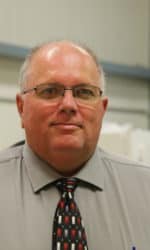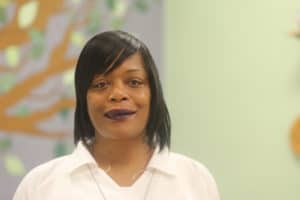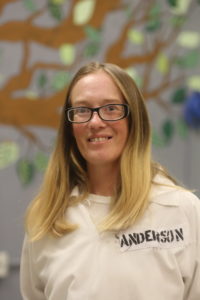UAMS-Backed Program Offers Lactation Services for Imprisoned Mothers
| Thanks in part to UAMS Health, the Arkansas Department of Corrections recently dedicated a room for new mothers to pump and breastfeed at the J. Aaron Hawkins Sr. Center, a medium-security prison in Wrightsville.
It is part of a program called Growing Together that works to support the needs of incarcerated women who are pregnant or have recently given birth and want to provide breast milk for their children.
Melissa Zielinski, Ph.D., is a clinical psychologist in the UAMS College of Medicine Department of Psychiatry. She has

Melissa Zielinski, Ph.D., is a clinical psychologist in the UAMS College of Medicine Department of Psychiatry.
volunteered at the Hawkins Unit since 2017 and built rapport with many of the women there.
When she got the invitation from Deputy Warden Billy Inman to help build a support program for pregnant women in the facility, Zielinski felt it important to hear their suggestions. She met four times with women to discuss their needs for prenatal support, labor and delivery, and postnatal support before outlining a program proposal.
“To me, it’s imperative that the people who are affected by this have a voice in the health care decisions that are made,” Zielinski said. “It was wonderful to have so many ideas from them.”
Lactation support was first. And it came sooner than expected. After approval from Arkansas Department of Corrections Secretary Wendy Kelly, the plan was in place to have a pump and information on hand for the next mom due to deliver. UAMS Health Clinical Services Manager Charice Riggins got a call just days later asking for breast pumps and information immediately. The baby had arrived two weeks early.
“Everything worked out,” Riggins said. “We got them what they needed. Now the lactation team is getting ready to go to Wrightsville’s to teach the patients and staff about breastfeeding. This means a lot to us to be able to help an underserved population and give them something that is outside of the care we give in the hospital. That’s what UAMS is about.”
Nicole Smart is a reentry administrator for the Division of Correction. She says reentry programs, have evolved over the years to better meet women’s needs. There are about 10-12 women at any given time pregnant in the Hawkins Unit.
“This program is beneficial because in the past, prison was more about punishment over treatment,” Smart said. “No one focused on reunification. Growing Together gives moms hope that they can one day have a healthy relationship with their child.”
Smart executed the details to get the program up and running. She acted as a liaison to transport pumps from the UAMS Medical Center to Wrightsville and found volunteers to transport breast milk safely and efficiently.
“Many of these women are going to be able to leave very soon,” Zielinski said. “Part of the goal with lactation is that they will maintain their milk supply until they’re home with their baby.”
Zielinski and others are working on other needs like support during labor and delivery, physical activity classes appropriate for pregnant women, parenting classes, and helping women navigate the reunification process.
Recently, representatives from the Arkansas Department of Health, UAMS, and The Doulas met with the Hawkins Unit health administrator warden, and deputy warden to brainstorm a plan to get each of the pieces the women asked for. The UAMS Department of Family and Preventive Medicine has also provided support and resources including sending breastfeeding capes for mothers who prefer to use them.
“These ladies need hope. This program for them is like a step in the right direction,” Deputy Warden Inman said. “We can incarcerate like we always have, and we’ll get the same results we’ve always had; or we can treat them like the women and the moms they are, helping them develop a bond with their children. Just because you’re in prison doesn’t mean you’re not a mother.”
Mea Bennett and Jamie Swan have been able to pump for their babies and even breastfeed during visitations.
“I never expected to be in this situation,” Bennett said. “But it means a lot to me to be able to provide for her growth.”
“It allows you to be with your baby, even when you’re not,” Swan said. “I get to see her every weekend. Pumping makes the week go by faster.”
What’s Next?
Lakishia Cochran and Shannon Anderson delivered shortly before the program started.
They are among the women who offered Zielinski and others meaningful ideas to get the program started.
Cochran lives too far away from her family for weekly visits to be feasible. She has offered suggestions on how Growing Together can better serve inmates who live farther away.
“We also need parenting classes,” Cochran said, “because there is a lot to deal with being a new parent and especially when you’re in prison.”
Anderson chose adoption for her son because she feels the state lacks needed resources in making parenting after prison successful for her. She has older children and worries about generational incarceration. She says parenting classes will help encourage them to choose a better path.
“I was at a homeless shelter a month before I came to prison so I don’t have a parole address,” Anderson said. “The average woman leaving the prison will get a minimum wage job and bring home about $1,100 a month. Community support in housing would be helpful.”
Anderson says the state requirements for moms exiting prison to reunite with their children are insurmountable.
“If you’re leaving prison and going to a halfway house like I will be, you have 90 days to complete parenting classes, look for a job, meet with a parole officer and whatever else they require. And if you take my children away from me, what do I have to live for? Give me a reason to stay out of prison and not add to the recidivism rate.”
Anderson says the Growing Together program is a step in the right direction. But she doesn’t want it to stop with lactation services. Zielinski continues to listen to the women’s ideas.
“It’s an honor to work with these women. In my experience, women who become incarcerated have survived a tremendous number of things in their life and are actually very strong in ways that people don’t appreciate,” she said “It’s been so inspiring to see systems coming together to support them. Ultimately, that’s what’s going to give them a fighting chance.”







